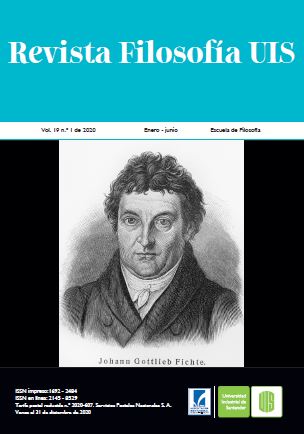Four ethics: a look from and beyond Nietzsche
Published 2020-01-01
Keywords
- ethics,
- survival,
- domination,
- submission,
- resistance
- Nietzsche ...More
How to Cite
Copyright (c) 2020 Revista Filosofía UIS

This work is licensed under a Creative Commons Attribution 4.0 International License.
Abstract
Supporting Nietzsche, when possible, and other authors, when necessary, this text addresses ―taking as a basis, the three transformations of the spirit enunciated by Nietzsche at the beginning of the Zarathustra, and the notion of the will to power― the possibility of infer four ethics, from the point of view of power: an obedience ethic oriented towards obedience, an ethics of resistance oriented towards rebellion, an ethic of survival oriented towards domination, and an ethics of survival oriented toward empowerment. The purpose of this paper is to expose the inconvenience of the first three ethics for an adequate exercise of democracy, and to propose, instead, the relevance of an ethic of empowerment.
Downloads
References
Alcaldía de Medellín. Campaña Portate Bien. Porque en Medellín se toma conciencia sobre los comportamientos que alteran la convivencia ciudadana. Recuperado de https://www.medellin.gov.co/irj/portal/medellin?NavigationTarget=navurl://3c3092487d6a9ab5522a091106130533
Arendt, H. (2002). La vida del espíritu. Buenos Aires: Paidós.
Bauman, Z. (2011). Modernidad y holocausto. Madrid: Sequitur.
De Greiff, L. (2013). Antología. Bogotá: Fondo de Cultura Económica.
Federico II de Prusia (1995). Antimaquiavelo o Refutación del Príncipe de Maquiavelo. (Editado en 1740 por Voltaire). Bilbao: Centro de Estudios Constitucionales.
Ferrero, G. (1991). El poder. Los genios invisibles de la ciudad. Madrid: Tecnos.
García, I. (2013). El Corán. Bogotá: Versión Interactiva.
Kant, I. (1972). Lo bello y lo sublime. Madrid: Espasa-Calpe.
Kant, I. (1977). Crítica del juicio. Madrid: Espasa-Calpe.
Los prisioneros. El baile de los que sobran. Recuperado de https://www.youtube.com/watch?v=uPJrZFBiy-A.
Maquiavelo, N. (2011). Maquiavelo. Barcelona: Gredos.
Mèlich, J. (2010). Ética de la compasión. Barcelona: Herder.
Nietzsche, F. (1976). Ecce homo. Madrid: Alianza.
Nietzsche, F. (2008). Fragmentos póstumos IV. Madrid. Tecnos.
Nietzsche, F. (2010a). Nietzsche I. Madrid: Gredos.
Nietzsche, F. (2010b). Fragmentos póstumos III. Madrid. Tecnos.
Nietzsche, F. (2011). Nietzsche II. Madrid: Gredos.
Pascal, B. (1984). Pensamientos. Madrid: Sarpe.
Reina-Valera (1960). La Santa Biblia. Recuperado de www.bibles.org.uk
Safranski, R. (2001). Nietzsche. Biografía de su pensamiento. Barcelona: Tusquets.
Santiago, T. (2009). “El dilema de la guerra”. En M. Barbosa y Z. Yébenes (eds.), Silencios, discursos y miradas sobre la violencia. Barcelona: Anthropos.
Serrat J. M. Fiesta. Recuperado de https://www.youtube.com/watch?v=J-W7YAdxLIQ
Villares, R. y Bahamonde, A. (2001). El mundo contemporáneo. Siglos XIX y XX. Madrid: Taurus.
Watson, P. (2002). Historia intelectual del siglo XX. Barcelona: Crítica.
